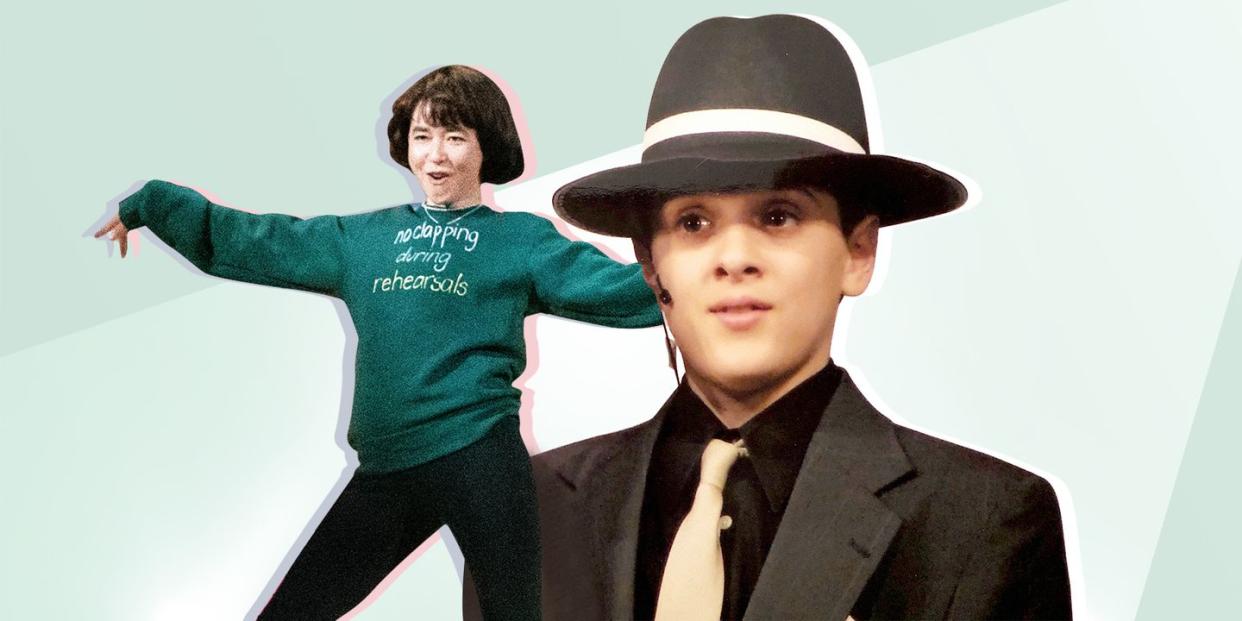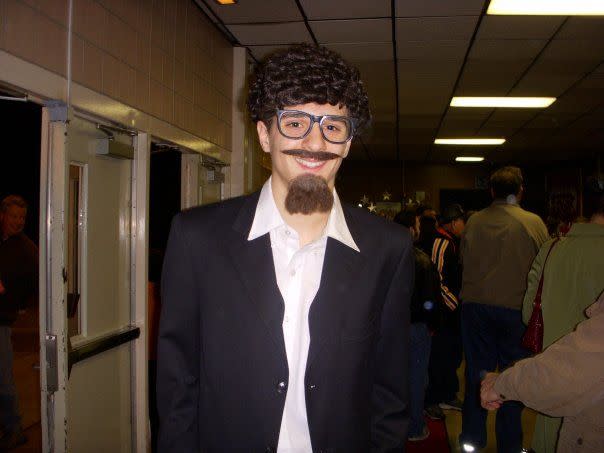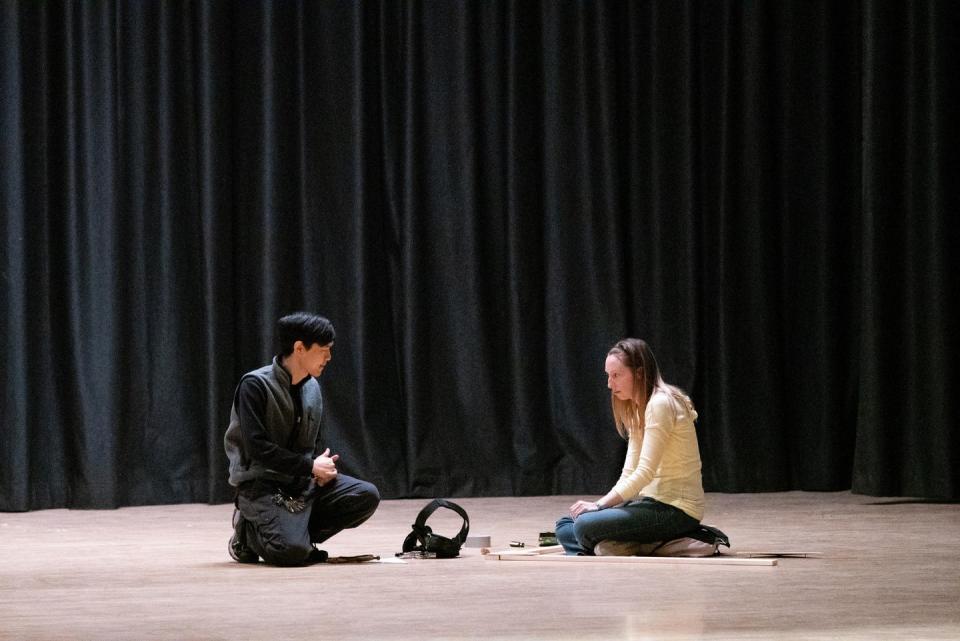'Pen15' Captures the Joy Of Being a Theater Kid With Humiliating Accuracy

In my junior year of high school, I was cast as Bela Zangler in Crazy For You, a zany jukebox musical full of famous numbers from the Gershwin songbook. Four years prior, I’d played Sky Masterson, the lead role in Guys and Dolls Jr. But then my voice dropped, my limbs extended, and my face sunk beneath a few layers of acne. By the time I got to 11th grade, I could barely walk onto the stage without tripping over my own size 13 shoes. Then Zangler came into my life. He was a goofball. As I soon found out, I could be a goofball, too. And since the slapstick intellectual only really appeared to provide comic relief, I never took part in any of the male ensemble numbers. That meant I got to spend most of my time backstage–with the girls. So, suffice it to say, I learned a lot that year.
Whenever I think about my days as a theatre kid, I often remember this eventful production of Crazy For You. I remember gluing a mustache on my face and ripping it off, night after night, which wore my upper lip so thin that, to this day, I can barely muster more than a Gomez Adams. I have uncomfortably sexual memories of the dancers at the end of dress rehearsals, pouring tablespoons of sweat out of their tan-colored bra cups. “Boob sweat,” they’d say, as it dripped into the trash can. And, of course, I remember the cast parties, and the reeling discovery that my longtime buddies–some of whom I’d known since pre-school–had been venturing into the nearby woods to drink alcohol. And smoke weed! These are some of the most exciting and terrible memories of my entire life, and I don’t know who I’d be today without them.
Pen15–a precious comedy series about middle school that goes to disgusting lengths to capture these sort of heartfelt memories–came back last week, and with it, the great and inevitable culmination of everything that the show has been careening toward since it first started. Caution, spoilers incoming: Maya and Anna become theatre kids. Yes, in the season’s two final episodes, Maya transforms into a glamorous, yet tormented pre-teen Elizabeth Taylor. Meanwhile, Anna dons the black duds and headset as the all-knowing, authoritarian stage manager. And although the episodes have no shortage of tumult, Pen15’s depiction of a middle school drama club is strikingly melancholic. It’s the sort of messy, true-to-life portrayal of amateur theatre that we’ve been missing from shows like Glee, where simple conclusions and empty singalongs often steal the show. Watching these episodes made me realize how lucky we are to have Pen15. It’s a series that is bold enough not to play these nostalgic (and humiliating) memories just for laughs, and capture the truth of what it was like to grow up in the early 2000s.

Now, before I go any further, I must admit, I was a musical theatre kid. The production in Pen15, The Days are Short–an inappropriately violent and humorless marital drama which seems like Who’s Afraid of Virginia Woolf by way of Kenneth Lonergan–is what I would have probably called a “straight play.” That’s the industry term I’d often hear used by my father, who was a professional pit musician. “I don’t do straight plays,” I’d say, always proudly withholding my formidable talents from the annual Fall Play, which usually conflicted with marching band. But that’s not to say the world of dramatic acting depicted in Pen15 is completely unfamiliar to me. After watching these episodes of Pen15, though, I’m convinced school plays and musicals aren’t all that different. Both are full of embarrassing and shameful experiences that will seem unfathomable later in life. Both conclude with the cast receiving sweatshirts emblazoned with inside jokes from the production like No clapping during rehearsal!, ensuring that the theatre kids remain fully isolated from the rest of the student body for years to come.
Episode 6, “Play,” begins, as all great stories do, with the unveiling of a Cast List. To our surprise, it is Maya, not Anna, who wins the leading role in The Days are Short. This comes as a devastating blow to the girls’ budding friendship–Anna has already proven herself to be the talented songbird of the duo. Pen15 conveys Anna’s disappointment through weighted silences, not hysterics, though. This is how it goes. I was the lead in my 7th grade production of Guys and Dolls. When it was announced that we’d be doing Music Man the following year, I thought for sure–I knew–that I’d be playing Harold Hill that Spring. But instead I got cast as The Mayor, which cursed me to being typecast as stubborn old men for the next three years. My closest friend won the role of Hill, even though he didn’t even have the right hair for it like I did (I prided myself on having curly hair just like Robert Preston in the movie). Almost twenty years later, I can still feel the sting of quiet injustice I felt that morning, seeing that list. Like Anna, I couldn’t accept the blow to my ego, so I stayed quiet. I couldn’t humble myself. I even recall trying to convince the director to give The Mayor a song or two, since I saw myself as such a gifted singer–which more or less happens in Pen15 when Anna tragically belts “Ave Maria” for the director in a last-ditch effort to get herself a role in the show.
Anna does, however, still manage to find herself a path into the strange and horny world of middle school theatre. While Maya enjoys the first bit of validation that she’s been granted since entering the miserable hellscape of 7th grade, Anna unintentionally becomes ordained a “techie.” This allows Pen15 to showcase a part of drama club that we almost never get to see. Too often, stories about theatre forget that there is a whole world behind the curtains of the production. Here, everyone–even the stagehands–are on display. Anna finds strength with her fellow techies, and community too. Her Type A perfectionism turns out to be exceptionally useful for building sets and snapping actors into their place. The series even gives us a wise “old” techie (he’s in 9th grade), the kind you’d often see emerge from the shadows to fix a crackly lavalier microphone or answer a trivia question between cues. He’s the classic go-to guy of the production, an obscure figure that proves the creators’ intimate knowledge of the drama club world. And based on the chemistry between him and Anna, this isn’t the last we’re going to see of Techie Steve in Pen15, I think.
As the production rushes toward its opening, Maya, too, develops a romance. She finds her first boyfriend in Gabe, her onstage partner. Stage couples consistently end up becoming real couples; I remember watching two of my friends who were playing a brother and sister pair in a show end up in a very serious relationship (hey, in drama club, everything is fair game). I had my share of romantic (and sexual) experiences as a theatre kid, too. In the summer I played The Genie, I remember a girl showing me how she could queef on command under her bathing suit at the pool; there was the short-lived elation that I would be providing my co-star her first kiss onstage in Guys and Dolls; and even in Music Man, when I played the grumpy old mayor, I ended up buddying up with an ensemble member who would become my first long term girlfriend. But Maya’s relationship, unfortunately, wasn’t as simple as mine. Gabe, as the series has been teasing, is unsure of his sexuality. And by the end of their fling, he finally begins to gain some clarity, much to her confusion–and dismay. Their relationship doesn’t erupt, as it would in other shows about theatre, into some profound whirlwind of newfound identity, though. He just sucks on her cheek instead of giving her a first kiss. It’s about as conclusive an ending for the two of them as a voluntary queef at a pool party. This is the exact sort of unapologetic messiness that makes Pen15 so lifelike.

When we finally reach the big opening night, it’s not the meticulously-choreographed suspense of the moments leading up to the show, or even the show itself that really spoke to me. What I was struck by was the wordless sequence that occurs, completely out of the blue, after we get to see a few initial scenes from the play. Whenever we see theatre productions in films or television, what we’re seeing, really, is a bunch of actors performing for a staged audience. It can get close to the thrill of watching actual theatre, but it never really does. Pen15 tries something I’ve never seen before. After a tense interruption where Maya forgets her line, and Anna, the intrepid stage manager, helps her find it, The Days are Short unfurls into a magnificent, cast-wide ballet. The words stop, and the filmmakers break form. Accompanied by operatic music, suddenly, the curtains open to show Anna, backstage, performing an interpretative dance that relays the weight she’s been holding to keep this show afloat. The camera glides around the auditorium, giving us Maya’s parents and older brother, all of them sending physical messages of love to her without dialogue or explanation. It tours the crowd to the spot where Anna’s parents should be (her father is, again, missing) and shows her mother motioning appreciation, and perhaps dismay, toward her daughter backstage. By the end of it, we’ve received all the information we need about the production, and all of it has been told just through pantomime and body language, which is the basis of any form of acting–television, theatre, or otherwise.
My experiences on the stage in middle school and high school never blossomed into a gorgeous ballet, but the stream of memories that flow through my head certainly have a magical quality about them. You don’t know what it feels like to be up there unless you’ve done it yourself, and unlike a lot of depictions of theatre, like, say, Birdman, or High School Musical, Pen15 was courageous enough to abandon convention and articulate that allure without using words. It shows the way the spotlights create a kind of electric fog between you and the audience, the eyes of the other performers onstage sparkling as you all flail in desperation not to let each other down. The sequence provides the feeling of invincibility, seeing your parents and your friends and your teachers in the crowd, all of them hanging on your every word. It conveys that rousing fear of humiliation, and that rush of victory on every applause break. It says it all! Being in a theatre production as a teenager, it’s scary, it’s embarrassing, but it’s also intoxicating. If you were a part of your school’s drama club, you know, as soon as the show starts, it’s over. And it will never happen exactly like that again. As Maya says at the end of their play, “The days are short, Joe. The days are short.”
You Might Also Like

